Newsletter Video, April 2023
Click Below - Add Your Own Comment
Disclaimer - the exercises here are for educational purposes only and before you try any of them, consult with your therapist or doctor.
Movements of the Month for the Shoulder
If you need to purchase therapeutic bands, we recommend getting them from Amazon. Click here to see them on Amazon. Note, they have a latex-free option if needed.
Important: this is NOT an affiliate or commission link. We do NOT receive any payment or commission for any sales from Amazon or any other affiliates if you purchase from this link. It is provided solely for your convenience.
External Rotation with Shoulder Elevation
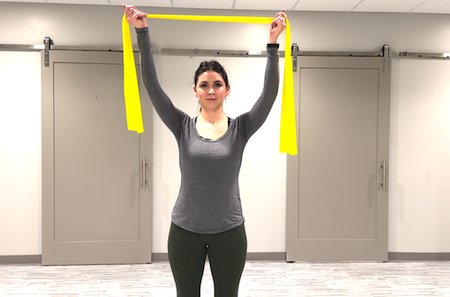
- Using a light resistance band, start with your elbows at your side and bent 90 degrees.
- Rotate your arms so the hands separate as demonstrated in the video.
- Straighten your elbows and lift the arms overhead.
- Lower them back down and return the hands to the starting position.
Start with light resistance like a yellow therapy band that provides approximately 3 lbs. of resistance.
Repeat 10-15 times, with a 60-second rest between each set.
Perform 2-3 sets.
Some tips to keep in mind:
- Perform the motion slowly
- Separate the (externally rotate the shoulders) through a comfortable range of motion.
- Raise the arms overhead to a comfortable position, don’t force it.
Horizontal Abduction with Shoulder Blade Retraction
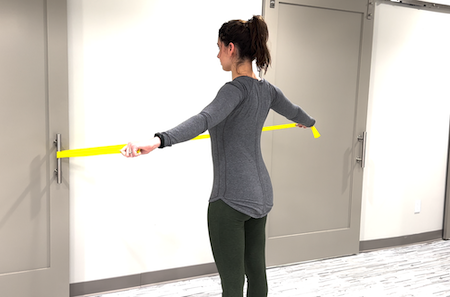
- Fasten a resistance band to a door or a post at or slightly below chest level.
- Keep your elbows straight and position your hands out in front of your chest.
- Keeping your arms straight, pull the band in a backward position focusing on pinching the shoulder blades together as illustrated in the video.
- In a controlled manner, return to the starting position.
Start with light resistance like a yellow therapy band that provides approximately 3 lbs. of resistance.
Repeat 10-15 times, with a 60-second rest between each set.
Perform 2-3 sets.
Some tips to keep in mind:
- Keep the hands down below shoulder level.
- Keep the elbows straight throughout the exercise.
- Keep your shoulders down - don't shrug.
- Focus on pinching the shoulder blades to work those muscles.
Wall Push Up with Plus Movement and Progression
The Basic Wall Push Up
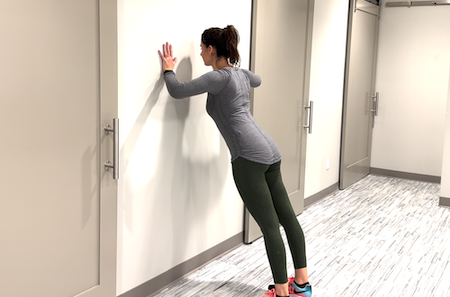
- Standing about arm’s length away from the wall, place your palms on the surface.
- Your fingers should be pointing up.
- Perform a push up motion as demonstrated in the video.
- Return to the starting position
- At the end of the motion round your shoulders forward.
Repeat 10-15 times, with a 60-second rest between each set.
Perform 2-3 sets.
Some tips to keep in mind:
- Move through a comfortable range of motion. You do NOT have to move your head all the way to the wall
- Your elbows should be lower than shoulder level throughout the motion.
- Don’t forget to round your shoulder blades forward at the end to activate the serratus anterior muscles.
Progression 1: The Push Up with Plus Movement on a Kitchen or Bathroom Counter
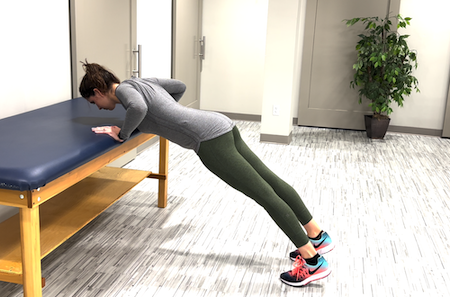
- Standing about arm’s length away from a STABLE kitchen or bathroom counter, place your palms on the edge of the surface.
- Perform a push up motion as demonstrated in the video.
- Return to the starting position.
- At the end of the motion round your shoulders forward.
Repeat 10-15 times, with a 60-second rest between each set.
Perform 2-3 sets.
Some tips to keep in mind:
- Move through a comfortable range of motion. You do NOT have to move your head all the way to the counter’s edge.
- Your elbows should be lower than shoulder level throughout the motion.
- Keep your shoulders down - don't shrug.
- Don’t forget to round your shoulder blades forward at the end to activate the serratus anterior muscles.
Progression 2: The Bent-Knee Push Up with Plus Movement
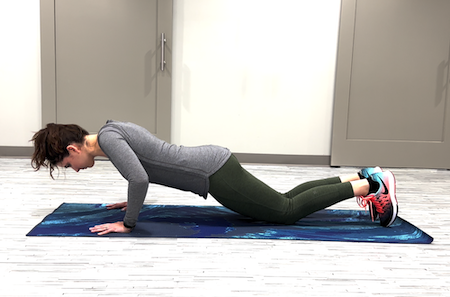
- Starting in a kneeling position, place your hands on the ground and assume a bent-knee push up position.
- Keep your knees in contact with the ground.
- Perform a push up motion as demonstrated in the video.
- Return to the starting position.
- At the end of the motion round your shoulders forward.
Repeat 10-15 times, with a 60-second rest between each set.
Perform 2-3 sets.
Some tips to keep in mind:
- Move through a comfortable range of motion. You do NOT have to move your head all the way to the ground.
- Keep your trunk straight and your bottom in line with your knees.
- Don’t let your lower back arch or sag.
- Keep your shoulders down - don't shrug
- Don’t forget to round your shoulder blades forward at the end to activate the serratus anterior muscles.
Progression 3: Full Push Up with Plus Movement
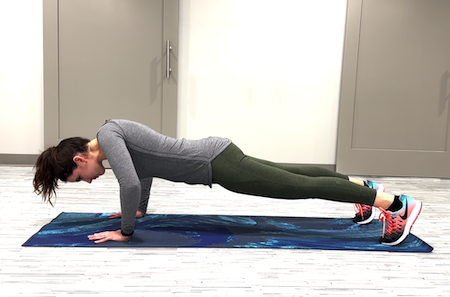
- Starting in a kneeling position, place your hands on the ground and assume a push up position.
- Your hands and toes should be in contact with the ground.
- Keep your trunk straight and your bottom in line with your knees and feet.
- Perform a push up motion as demonstrated in the video.
- Return to the starting position.
- At the end of the motion round your shoulders forward.
Repeat 10-15 times, with a 60-second rest between each set.
Perform 2-3 sets.
Some tips to keep in mind:
- Move through a comfortable range of motion. You do NOT have to move your head all the way to the ground.
- Keep your trunk straight and your bottom in line with your knees and feet.
- Don’t let your lower back arch or sag.
- Keep your shoulders down - don't shrug. Don’t forget to round your shoulder blades forward at the end to activate the serratus anterior muscles.
Newsletter Video Archive
Disclaimer
The information in this video is intended for informational and educational purposes only and in no way should be taken to be the provision or practice of physical therapy, medical, or professional healthcare advice or services. The information should not be considered complete or exhaustive and should not be used for diagnostic or treatment purposes without first consulting with your physical therapist, occupational therapist, physician or other healthcare provider. The owners of this website accept no responsibility for the misuse of information contained within this website.
